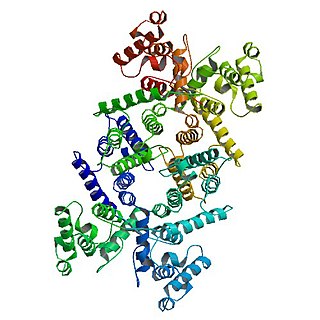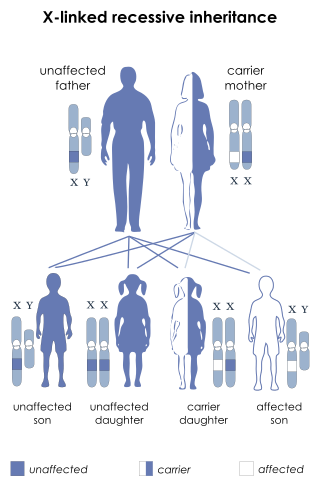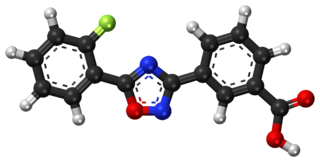
Dystrophin is a rod-shaped cytoplasmic protein, and a vital part of a protein complex that connects the cytoskeleton of a muscle fiber to the surrounding extracellular matrix through the cell membrane. This complex is variously known as the costamere or the dystrophin-associated protein complex (DAPC). Many muscle proteins, such as α-dystrobrevin, syncoilin, synemin, sarcoglycan, dystroglycan, and sarcospan, colocalize with dystrophin at the costamere. It has a molecular weight of 427 kDa

Duchenne muscular dystrophy (DMD) is a severe type of muscular dystrophy that primarily affects boys. Muscle weakness usually begins around the age of four, and worsens quickly. Muscle loss typically occurs first in the thighs and pelvis followed by the arms. This can result in trouble standing up. Most are unable to walk by the age of 12. Affected muscles may look larger due to increased fat content. Scoliosis is also common. Some may have intellectual disability. Females with a single copy of the defective gene may show mild symptoms.

Becker muscular dystrophy is an X-linked recessive inherited disorder characterized by slowly progressing muscle weakness of the legs and pelvis. It is a type of dystrophinopathy. This is caused by mutations in the dystrophin gene, which encodes the protein dystrophin. Becker muscular dystrophy is related to Duchenne muscular dystrophy in that both result from a mutation in the dystrophin gene, but has a milder course.
Antisense therapy is a form of treatment that uses antisense oligonucleotides (ASOs) to target messenger RNA (mRNA). ASOs are capable of altering mRNA expression through a variety of mechanisms, including ribonuclease H mediated decay of the pre-mRNA, direct steric blockage, and exon content modulation through splicing site binding on pre-mRNA. Several ASOs have been approved in the United States, the European Union, and elsewhere.
Sarepta Therapeutics, Inc. is a medical research and drug development company with corporate offices and research facilities in Cambridge, Massachusetts, United States. Incorporated in 1980 as AntiVirals, shortly before going public the company changed its name from AntiVirals to AVI BioPharma soon with stock symbol AVII and in July 2012 changed name from AVI BioPharma to Sarepta Therapeutics and SRPT respectively. As of the end of 2019, the company has two approved drugs.
BioMarin Pharmaceutical Inc. is an American biotechnology company headquartered in San Rafael, California. It has offices and facilities in the United States, South America, Asia, and Europe. BioMarin's core business and research is in enzyme replacement therapies (ERTs). BioMarin was the first company to provide therapeutics for mucopolysaccharidosis type I, by manufacturing laronidase. BioMarin was also the first company to provide therapeutics for phenylketonuria (PKU).

Deflazacort is a glucocorticoid used as an anti-inflammatory and immunomodulatory agent. It was patented in 1965 and approved for medical use in 1985. The U.S. Food and Drug Administration (FDA) considers it to be a first-in-class medication for Duchenne Muscular Dystrophy.

Ataluren, sold under the brand name Translarna, is a medication for the treatment of Duchenne muscular dystrophy. It was designed by PTC Therapeutics.
In molecular biology, exon skipping is a form of RNA splicing used to cause cells to “skip” over faulty or misaligned sections (exons) of genetic code, leading to a truncated but still functional protein despite the genetic mutation.
Drisapersen is an experimental drug that was under development by BioMarin, after acquisition of Prosensa, for the treatment of Duchenne muscular dystrophy. The drug is a 2'-O-methyl phosphorothioate oligonucleotide that alters the splicing of the dystrophin RNA transcript, eliminating exon 51 from the mature dystrophin mRNA.

Eteplirsen is a medication to treat, but not cure, some types of Duchenne muscular dystrophy (DMD), caused by a specific mutation. Eteplirsen only targets specific mutations and can be used to treat about 14% of DMD cases. Eteplirsen is a form of antisense therapy.

Marathon Pharmaceuticals LLC was a privately held biopharmaceuticals company focused on drugs for people with rare diseases. The Illinois-based company developed and manufactured therapeutics and brought them to market. It employed 100 people in four global locations. In 2017, PTC Therapeutics acquired rights to Marathon Pharmaceuticals' drug Emflaza (deflazacort) for $140 million after criticism about their plan to sell the drug at a list price of $89,000 per year to sufferers despite the fact that the same drug was available in Canada and the UK for around $1,000 per year.

Ezutromid is an orally administered small molecule utrophin modulator involved in a Phase 2 clinical trial produced by Summit Therapeutics for the treatment of Duchenne muscular dystrophy (DMD). DMD is a fatal x-linked recessive disease affecting approximately 1 in 5000 males and is a designated orphan disease by the FDA and European Medicines Agency. Approximately 1/3 of the children obtain DMD as a result of spontaneous mutation in the dystrophin gene and have no family history of the disease. Dystrophin is a vital component of mature muscle function, and therefore DMD patients have multifarious forms of defunct or deficient dystrophin proteins that all manifest symptomatically as muscle necrosis and eventually organ failure. Ezutromid is theorized to maintain utrophin, a protein functionally and structurally similar to dystrophin that precedes and is replaced by dystrophin during development. Utrophin and dystrophin are reciprocally expressed, and are found in different locations in a mature muscle cell. However, in dystrophin-deficient patients, utrophin was found to be upregulated and is theorized to replace dystrophin in order to maintain muscle fibers. Ezutromid is projected to have the potential to treat all patients suffering with DMD as it maintains the production of utrophin to counteract the lack of dystrophin to retard muscle degeneration. Both the FDA and European Medicines Agency has given ezutromid an orphan drug designation. The FDA Office of Orphan Products and Development offers an Orphan Drug Designation program (ODD) that allows drugs aimed to treat diseases that affect less than 200,000 people in the U.S. monetary incentives such as a period of market exclusivity, tax incentives, and expedited approval processes.
Golodirsen, sold under the brand name Vyondys 53, is a medication used for the treatment of Duchenne muscular dystrophy (DMD). It is an antisense oligonucleotide drug of phosphorodiamidate morpholino oligomer (PMO) chemistry.
Viltolarsen, sold under the brand name Viltepso, is a medication used for the treatment of Duchenne muscular dystrophy (DMD). Viltolarsen is a Morpholino antisense oligonucleotide.

Cure Rare Disease is a non-profit biotechnology company based in Boston, Massachusetts that is working to create novel therapeutics using gene therapy, gene editing and antisense oligonucleotides to treat people impacted by rare and ultra-rare genetic neuromuscular conditions.
Toshifumi (Toshi) Yokota is a medical scientist and professor of medical genetics at the University of Alberta, where he also holds the titles of the Friends of Garrett Cumming Research & Muscular Dystrophy Canada Endowed Research Chair and the Henri M. Toupin Chair in Neurological Science. He is best known for his studies of antisense oligonucleotide-based therapeutics for muscular dystrophy that led to the development of an FDA-approved drug viltolarsen. His research interests include precision medicine for muscular dystrophy and genetic diseases. He has co-edited two books both published in the Methods in Molecular Biology series from Humana Press, Springer-Nature, and has published more than 100 refereed papers and patents. He is a member of the editorial boards for the International Journal of Molecular Sciences, Genes, Frontiers in Genome Editing, Frontiers in Physiology, and Nucleic Acid Therapeutics, a member of the Medical and Scientific Advisory Committee of Muscular Dystrophy Canada, and a co-founder of the Canadian Neuromuscular Network (CAN-NMD).

Ultragenyx is an American biopharmaceutical company involved in the Research and Development of novel products for treatment of rare and ultra-rare genetic diseases for which there are typically no approved treatments and high unmet medical need. The company works with multiple drug modalities including biologics, small molecule, gene therapies, and ASO and mRNAs in the disease categories of bone, endocrine, metabolic, muscle and CNS diseases.
Casimersen, sold under the brand name Amondys 45, is an antisense oligonucleotide medication used for the treatment of Duchenne muscular dystrophy (DMD) in people who have a confirmed mutation of the dystrophin gene that is amenable to exon 45 skipping. It is an antisense oligonucleotide of phosphorodiamidate morpholino oligomer (PMO). Duchenne muscular dystrophy is a rare disease that primarily affects boys. It is caused by low levels of a muscle protein called dystrophin. The lack of dystrophin causes progressive muscle weakness and premature death.









